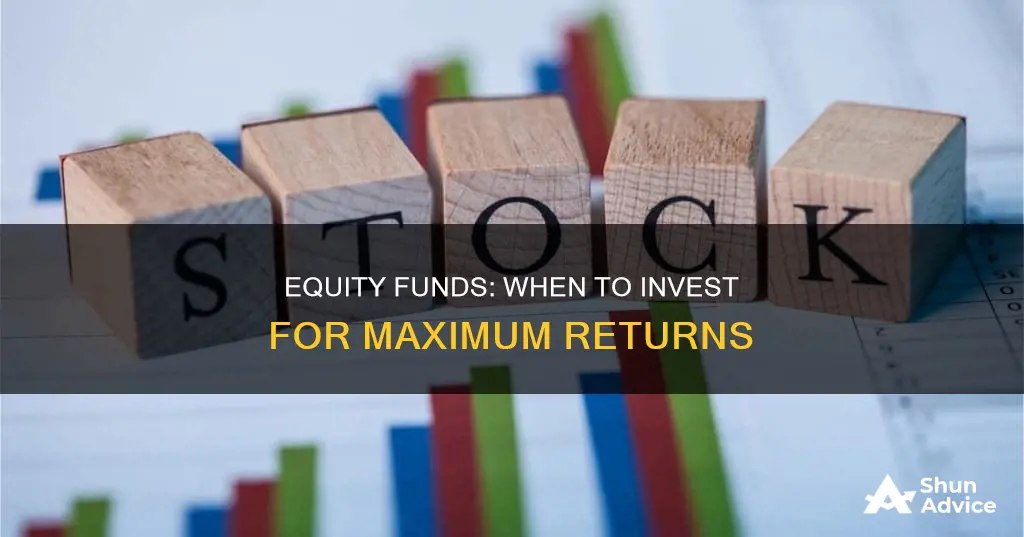
Investing in equity funds is a popular option for those who want to participate in the equity markets without purchasing stocks directly. Equity funds, a type of mutual fund or exchange-traded fund (ETF), pool investor money to buy ownership in businesses, usually in the form of publicly traded common stock. They are ideal for investors who want exposure to the equity markets but are wary of direct stock purchases. This introduction will explore the benefits, risks, and different types of equity funds to help you understand when to invest in this asset class.
| Characteristics | Values |
|---|---|
| Type of investment | Direct investment through stocks or investment via mutual funds |
| Investment goals | Long-term financial goals, e.g. children's education, retirement |
| Risk appetite | High-risk tolerance |
| Diversification | Well-diversified portfolio |
| Investment amount | Low minimum investment amount, e.g. INR 500 |
| Investment style | Based on market capitalization, geography, or investment strategy |
| Market conditions | Do not base investment decisions on prevailing market conditions |
| Investment horizon | Long-term horizon |
| Investment research | Research and due diligence required for stock picking |
| Investment management | Actively or passively managed |
What You'll Learn

Weigh the pros and cons of equity funds vs individual stocks
When it comes to investing in equity funds, there are two main routes: investing in equity mutual funds or purchasing individual stocks. Both options have their own advantages and disadvantages, which should be carefully considered before making any investment decisions.
Equity Mutual Funds
Equity mutual funds are managed by professionals who conduct research, track market movements, and make investment decisions on behalf of the investors. This can be beneficial for those who do not have the time or expertise to make their own investment decisions. Mutual funds also offer instant diversification, as they typically invest in a wide range of stocks and bonds from different industries and sectors. This diversification helps to reduce the overall risk of the investment.
Another advantage of equity mutual funds is that they are highly liquid, meaning that investors can easily convert their investments into cash if needed. Additionally, mutual funds have a relatively small ticket size, allowing investors to start with a low initial investment and gradually increase their contributions.
However, one of the main drawbacks of equity mutual funds is the lack of control over the specific stocks or companies invested in. Investors in mutual funds do not have a say in the stock selection and must rely on the fund manager's choices. Mutual funds also typically charge management fees and expenses, which can eat into the overall returns.
Individual Stocks
Investing in individual stocks offers the potential for higher returns, especially if the company is growing rapidly. Investing in stocks of a single company can result in more substantial gains compared to the diversified portfolio of a mutual fund.
Investing in individual stocks also provides investors with more control over their investment choices. They can choose the specific companies they want to invest in based on their own research and preferences. Additionally, there are often commission-free trading options available when investing in individual stocks.
However, investing in individual stocks is generally considered riskier than investing in mutual funds. The performance of an individual stock is tied to the fortunes of a single company, and negative events or poor performance can result in significant losses.
Additionally, investing in individual stocks requires more effort and time for research and monitoring of the market and individual companies. It can be challenging to consistently pick winning stocks and time the market correctly.
Both equity mutual funds and individual stocks have their own advantages and disadvantages. Equity mutual funds offer professional management, instant diversification, and liquidity, but come with fees and less control over specific investments. On the other hand, individual stocks offer the potential for higher returns and more control, but carry a higher level of risk and require more effort and time for research and monitoring.
The decision between investing in equity mutual funds or individual stocks depends on an investor's financial goals, risk tolerance, and time commitment. It is important to carefully consider these factors and seek advice from a financial advisor before making any investment decisions.
Rental Property vs Mutual Funds: Which is the Better Investment?
You may want to see also

Understand the different types of equity funds
Equity funds are categorised in several ways, including by risk levels, market capitalization, investment strategy, and tax treatment. Here is a detailed overview of the different types of equity funds:
- Risk Levels: Equity funds can be categorized according to risk levels. Diversified equity funds have no concentrated risk as they invest in equities across various sectors, spreading out the risks. ELSS (Equity Linked Savings Scheme) funds are slightly riskier as they aim to outperform over a longer time frame. Sector funds are considered high risk as they focus on a handful of sectors. Actively managed funds are also considered high risk as they are based on the perceptions and convictions of the fund house and fund manager.
- Market Capitalization: Equity funds can also be classified based on market capitalization, which refers to the total valuation of a company. Large-cap funds invest in well-known, highly liquid stocks of large-cap companies. Mid-cap funds invest in companies with potential to grow into large companies. Small-cap funds invest in smaller companies with significant growth potential but a higher risk of failure. Multi-cap or diversified equity funds invest across different market capitalizations and sectors to reduce risk.
- Investment Strategy: Equity funds may follow different investment strategies. Thematic or sectoral funds follow specific investment themes or sectors. Focused equity funds invest in a maximum of 30 stocks of companies with specified market capitalizations. Contra equity funds follow a contrarian strategy by investing in underperforming stocks assumed to recover in the long term.
- Tax Treatment: Equity funds can also be categorized as tax-saving or non-tax-saving schemes. ELSS funds offer tax benefits of up to Rs. 1.5 lakh under Section 80C of the Income Tax Act, with a lock-in period of 3 years. Non-tax-saving equity funds, including most other types of equity funds, are subject to capital gains tax.
- Active vs. Passive Funds: Active funds are actively managed by fund managers who handpick stocks for investment. Passive funds track a market index or segment, and the fund manager does not actively select stocks.
When investing in equity funds, it is important to consider your financial goals, risk tolerance, and investment horizon. These funds are generally suitable for long-term investors and carry a higher risk-return ratio.
Protect Your 401k: Invest in Mutual Funds for a Secure Future
You may want to see also

Know when to invest in equity funds for the long term
Equity funds are a special type of mutual fund or exchange-traded fund (ETF) that invests in common stocks, or "equities", rather than bonds. They are ideal for those who want to participate in the equity markets but are wary of direct stock purchases.
Equity funds can be actively managed, meaning a portfolio manager uses their own discretion to pick stocks, or passively managed, meaning the fund follows a market index. Actively managed funds tend to have higher fees.
There are three major kinds of equity funds: those focused on market capitalization, those focused on geography, and those following a particular investment style.
Market Capitalization
Market capitalization, or market cap, is an indication of a business's value based on share price and the number of outstanding shares. Equity funds in this category include:
- Mega-cap equity funds: Invests in stocks of companies with a market cap of $200 billion or more.
- Large-cap equity funds: Invests in companies with a market cap of between $10 billion and $200 billion.
- Mid-cap equity funds: Targets companies with a market cap of $2 billion to $10 billion.
- Small-cap equity funds: Invests in companies with a market cap of $300 million to $2 billion.
- Micro-cap equity funds: Invested in tiny publicly traded companies with a market cap of between $50 million and $300 million.
Geography
These funds are invested in companies in one or more regions of the world:
- Global or worldwide equity funds: Invested in stocks around the world, including in the United States.
- International equity funds: Invest exclusively in stocks outside of the U.S.
- Country or regional equity funds: Invests in stocks solely in the home country or region of the investor and issuer.
Investment Style
These funds use one of four major methodologies when selecting stocks: the top-down strategy, bottom-up strategy, growth strategy, or value strategy. Examples include:
- Sector- or industry-specific equity funds: Employ a top-down strategy where the best stocks in a particular industry or sector are included.
- Equity income funds: Employ a bottom-up strategy, seeking ownership of businesses that pay a significant dividend, often irrespective of the sector.
- Growth funds: Employ the growth strategy, investing in stocks with a consistent track record of profitability and growth.
- Value funds: Seek to buy undervalued stocks that are expected to grow substantially in the future.
When to Invest in Equity Funds for the Long Term
When investing in equity funds for the long term, it is important to remember that short-term volatility and trends do not matter. Equity is considered ideal for achieving long-term goals as it can offer superior returns than other asset classes over time.
- Diversification: Opt for equity funds that are diversified across industries and sectors to reduce the quantum of risk associated with equity investments.
- Long-term fund performance: Consider the fund's long-term performance and how well it has performed during bearish phases. Opt for funds with consistent returns that have contained losses during market downturns.
- Fund fundamentals: Look at the fund's investment composition and the entities it invests in. Identify how long the fund manager has been managing the fund, as performance depends largely on their calls.
- Expense ratio: The expense ratio is the amount that fund houses charge investors to address fund management costs. A high ratio can eat into profits, so opt for funds with lower expense ratios.
- Financial goals: Ensure that your investments are aligned with your long-term financial goals, such as children's education, retirement, etc.
Investing Now: Choosing the Right Funds for Your Portfolio
You may want to see also

Learn how to choose the right equity fund
Equity funds are a special type of mutual fund or exchange-traded fund (ETF) that invests in common stocks, or "equities", rather than bonds. They are ideal for those who want to participate in the equity markets but are wary of direct stock purchases.
There are three major kinds of stock funds: those focused on market capitalization, those focused on geography, and those following a particular investment style.
When choosing an equity fund, it is important to consider the fund's long-term performance and how well it has contained losses during bearish phases. It is also crucial to look at the fund's fundamentals, such as its investment composition and the entities it invests in. The expense ratio, or the fees and expenses charged by the fund house, should also be considered as this can eat into profits.
- Diversification: Diversification is important to reduce risks and get maximum capital appreciation and tax benefits. Equity funds themselves are a form of diversification, but it is also important to consider the diversification within the fund. Look at the fund's portfolio to understand how it is spread across different sectors and industries.
- Fund House Pedigree: Consider the track record of the fund house and how it has performed during downturns. Evaluate the long-term returns that its funds have provided.
- Alignment with Financial Goals: Ensure that the equity fund you choose is aligned with your long-term financial goals. For example, if you are investing for children's education or retirement, you will likely be investing for the long term and seeking superior returns over other asset classes.
- Investment Style: Understand the fund's objective and investment style. This can vary widely, with some funds focusing on market capitalization, geography, or a particular investment strategy. Choose a fund whose strategy you agree with and whose holdings you are comfortable with.
- Costs: Look for equity funds with low costs, as measured by the expense ratio and the lack of a sales load.
- Portfolio Management: Choose a fund with a history of steady portfolio management and a clearly defined mission. Understand the types of assets the fund acquires, the reasons it acquires them, and the reasons it sells them.
In addition to these factors, it is also important to consider your own risk tolerance, budget, and short-term and long-term investing goals when choosing an equity fund.
Hedge Fund Investment Strategies: Where and How They Invest
You may want to see also

Compare equity funds with mutual funds
Equity funds and mutual funds are both investment options for those interested in participating in the equity markets. Equity funds are a type of mutual fund scheme, meaning that they are a category of mutual fund.
Equity Funds
Equity funds are ideal for those who want to participate in the equity markets but are wary of direct stock purchases. They are a mutual fund scheme that buys ownership of various businesses that are publicly traded. This is done by pooling investors' money to buy stocks in these businesses. The objective of equity funds is to seek out opportunities to invest in businesses that will grow, yielding profits for shareholders.
There are different types of equity funds, categorised according to risk levels. These include diversified equity funds, which have no concentrated risk as investments are made across various sectors, and Equity Linked Savings Schemes (ELSS), which are slightly riskier as their portfolios are expected to outperform over a longer time frame.
Mutual Funds
Mutual funds are one of the most popular financial instruments to build a corpus for different life goals. They are a good option for those who don't have the skills or time to invest directly in stocks. With mutual funds, a fund manager picks stocks and makes calls on the investor's behalf, leveraging their expertise to research and keep track of market movements.
Mutual funds also diversify investments across industries and sectors, reducing the risk associated with equity investments. They are highly liquid and can be started with a small amount of money, making them accessible to a wide range of investors.
Comparison
Both equity funds and mutual funds are suitable for long-term financial goals, such as children's education and retirement. They are both managed by fund managers and can be diversified to reduce risk.
The key difference is that equity funds are a type of mutual fund, specifically focused on investing in publicly traded stocks, whereas mutual funds can be used to invest in a variety of assets, including stocks, bonds, and other securities. Equity funds are also generally considered riskier than mutual funds, as they are more susceptible to market volatility.
When comparing equity mutual funds, it is important to look at long-term performance over 5, 7, or even 10 years, rather than just short-term returns. It is also crucial to consider the consistency of returns, downside protection, and fund performance relative to the right benchmark, such as category average returns.
In summary, equity funds are a type of mutual fund focused on investing in stocks, and both options can be suitable for long-term financial goals. The choice between the two depends on the specific needs and risk appetite of the investor, as well as factors such as diversification, fund performance, and liquidity.
What's the Return on Investment for Founders?
You may want to see also
Frequently asked questions
Equity funds are a type of mutual fund or exchange-traded fund (ETF) that invests in common stocks, or "equities", rather than bonds. They are ideal for those who want to participate in the equity markets but are wary of direct stock purchases.
Equity funds are professionally managed, meaning that fund managers pick stocks and make buy, sell and hold decisions on your behalf. They also provide diversification, reducing the risk associated with equity investments.
As with all investments, there are risks involved with equity funds. Market risks impact equity funds directly, and stocks will often rise or fall in value based on market forces. Other types of risk include credit risk, foreign currency risk, liquidity risk, political risk, economic concentration risk, and inflation risk.
You can invest in equity funds by opening an account directly with a mutual fund family, such as Vanguard or Fidelity, or by buying shares of an equity fund through a brokerage account or retirement plan.







